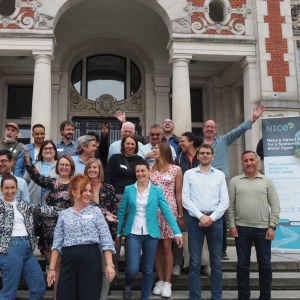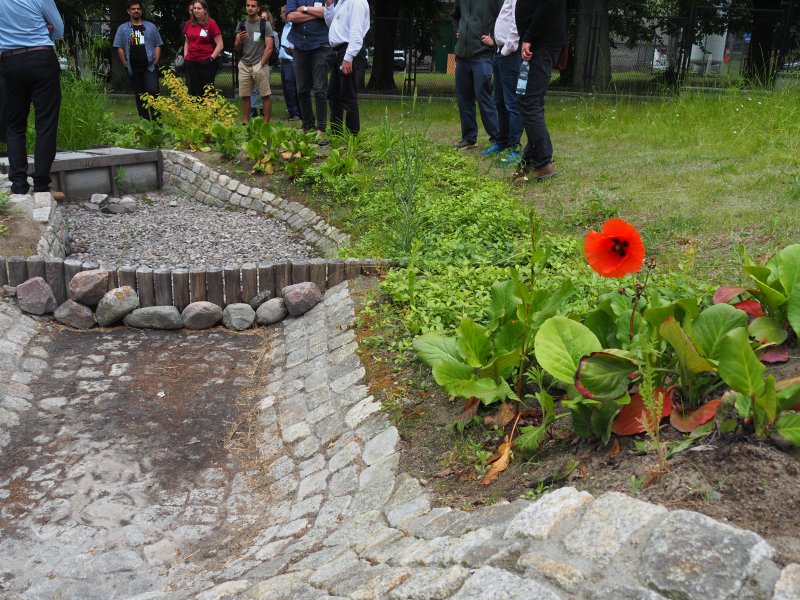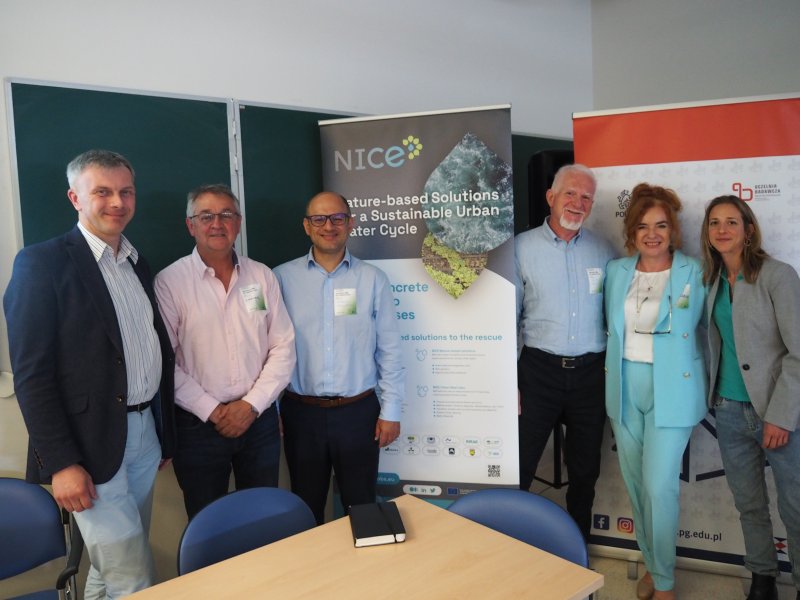
120 Years of Gdańsk University of Technology
Gdańsk University of Technology recently celebrated its 120 year anniversary, the perfect chance to celebrate and to discuss future applications of its innovative technologies for water treatment and nature-based solutions in cities. At the campus entrance, one finds a beautiful rain garden, one of the pilots of the NICE NbS project. The retention facility is able to collect rainfall from a local catchment. Though acceptance of the implementation was at first slow, the rain garden now stands as a beloved part of the campus with possible plans for further development of other rain gardens.
This June diverse stakeholders came together to exchange on water at a one of a kind EU Green Week Side event. The event, “EU Green Week Side Session: "Innovative Nature-based Solutions for Resilient Cities", featured a programme full of panels meant to paint a story of the history of innovation in water treatment and nature-based solutions, first in the Polish context and with examples from best practice case studies.
Speakers in the first half of the day were:
- Daiane Trevisan Ruwer, CETIM
- Pascal Molle, INRAE
- Simos Malamis, National Technical University of Athens
- Prof. Krzysztof Jóźwiakowski, University of Life Science in Lublin
- Prof. Ewa Wojciechowska, Gdańsk Tech
- Prof. Magdalena Gajewska & Team, Gdańsk Tech
The day culminated in an hybrid panel moderating by Carme Machi Castaner of ICLEI Europe:
- with Fabio Masi, IRIDRA
- Simon Malamis, National Technical University of Athens
- Carlos Arias, Aarhus University
- Wojciech Szpakowski, Gdańsk Water Company
- Prof. Magdalena Gajewska Gdańsk Tech
in which speakers discussed crucial questions on how to mainstream and future-proof these vital technologies. In this session, certain important factors were identified as important for uptake and replication of innovation in the field.
Working with municipalities
When it comes to waste water treatment, relations between technicians and municipalities are important. For example, scientists at Gdansk University of Technology have a close relationship with the Gdansk Water Company. At our panel, Wojciech Szpakowski of Gdansk Water Company noted that nature-based solutions can be seen as an entrance to the city, in that new forms of urban landscape such as retention squares are a great investment that adds value for residents.
Tools for decision-makers
To make such decisions on how to use urban space, it can help decision-makers to have access to tools to weigh options such as our NICER tool. NICE expert Neil Sang of the Swedish University of Agricultural Sciences weighed into this discussion and reminded the audience that software is not always neutral and that such tools should be collaborative. Simon Malamis of National Technical University of Athens pointed out that once selected, solutions still have to be retrofitted and their social acceptance must be built. Building on the discussion, Carlos Arias of Aarhus University mentioned that while training decision makers is needed, the last step is building and following up to ensure maintenance of systems.
Facing complexities
Prof. MagdalenaGajewska of Gdańsk Tech summed up ideas nicely calling to the complexities of implementing such solutions in cities saying,
“There are issues with perception. In the case of NbS you need to be more focused on the case. Case tailored solutions. It means that it’s a bit more complicated and more demanding on the designer. This means we need to build the capacity of NbS from the very beginning from the low social acceptance to the knowledge of its added value.”
NICE NbS has a portfoilio of such cases and are in the process of creating guidelines to further NbS implementation for water treatment.
Are you looking for examples on effective mainstreaming of water treatment NbS in your locality? You are welcome to take part in the next 5th NICE Cities Panel on 24 June 10:00-12:00 CEST. More info and registration available here.
Explore further programming of the EU Green Week 2024.


